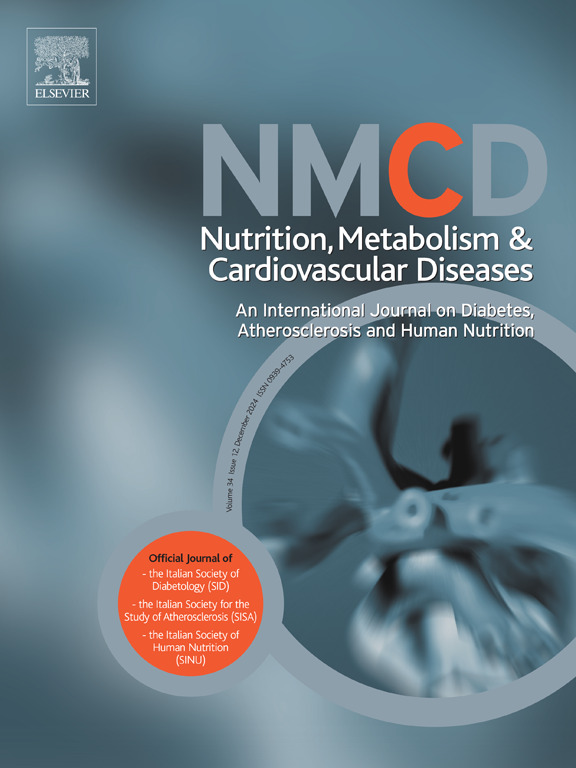Is the triglyceride-glucose index ready for cardiovascular risk assessment?
IF 3.3
3区 医学
Q2 CARDIAC & CARDIOVASCULAR SYSTEMS
Nutrition Metabolism and Cardiovascular Diseases
Pub Date : 2025-03-01
DOI:10.1016/j.numecd.2024.103834
引用次数: 0
Abstract
Aims
Insulin resistance is a major risk factor for cardiovascular disease. Thus, early identification of insulin resistance is important for classifying individuals at high cardiovascular risk. All the tools commonly used in epidemiological studies and clinical practice to assess insulin resistance require measuring insulin levels, which is a limitation. Hence, simpler methods have been proposed to overcome these limitations. One of the most promising is the triglyceride-glucose index.
Therefore, this narrative review focuses on the most significant epidemiological findings concerning the relationship between the triglyceride-glucose index and cardiovascular risk. Furthermore, it also highlights this new tool's strengths, limitations, and perspectives for assessing cardiovascular risk.
Data synthesis
Even though the assessment of this index is relatively recent, there are numerous papers on this topic, and their number is constantly increasing. Observational studies have shown a substantial positive association between the triglyceride-glucose index and cardiovascular risk, although some conflicting results have been observed.
Conclusions
The index is strongly associated with cardiovascular mortality and cardiovascular risk factors. However, some gaps need to be addressed.
甘油三酯-葡萄糖指数是否可以用于心血管风险评估?
目的:胰岛素抵抗是心血管疾病的主要危险因素。因此,胰岛素抵抗的早期识别对于心血管高危人群的分类是非常重要的。流行病学研究和临床实践中常用的评估胰岛素抵抗的所有工具都需要测量胰岛素水平,这是一个局限性。因此,提出了更简单的方法来克服这些限制。其中最有希望的是甘油三酯-葡萄糖指数。因此,这篇叙述性综述的重点是关于甘油三酯-葡萄糖指数与心血管风险之间关系的最重要的流行病学发现。此外,它还强调了这种新工具在评估心血管风险方面的优势、局限性和前景。数据综合:尽管对该指标的评估相对较新,但关于该主题的论文很多,而且数量还在不断增加。观察性研究表明,甘油三酯-葡萄糖指数与心血管风险之间存在显著的正相关,尽管观察到一些相互矛盾的结果。结论:该指数与心血管病死率及心血管危险因素密切相关。然而,有些差距需要解决。
本文章由计算机程序翻译,如有差异,请以英文原文为准。
求助全文
约1分钟内获得全文
求助全文
来源期刊
CiteScore
6.80
自引率
2.60%
发文量
332
审稿时长
57 days
期刊介绍:
Nutrition, Metabolism & Cardiovascular Diseases is a forum designed to focus on the powerful interplay between nutritional and metabolic alterations, and cardiovascular disorders. It aims to be a highly qualified tool to help refine strategies against the nutrition-related epidemics of metabolic and cardiovascular diseases. By presenting original clinical and experimental findings, it introduces readers and authors into a rapidly developing area of clinical and preventive medicine, including also vascular biology. Of particular concern are the origins, the mechanisms and the means to prevent and control diabetes, atherosclerosis, hypertension, and other nutrition-related diseases.

 求助内容:
求助内容: 应助结果提醒方式:
应助结果提醒方式:


